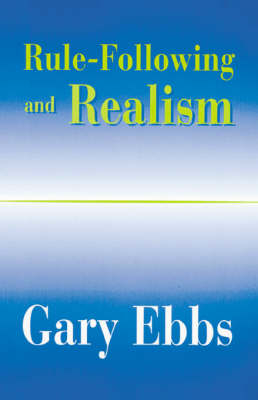
Rule-Following and Realism
Harvard University Press (Verlag)
978-0-674-78031-6 (ISBN)
- Titel ist leider vergriffen;
keine Neuauflage - Artikel merken
Through detailed criticism of standard interpretations of key arguements in analytical philosophy over the last 60 years, this book aims to present a new conception of the proper starting point and task of the philosophy of language. To understand central topics in the philosophy of language and mind, the author contends we must investigate them from our perspective as participants in shared linguistic practices. However, our efforts at adopting this participant perspective are limited by our lingering loyalties to metaphysical realism and scientific naturalism. The book aims to loosen the hold of these views by exposing their roots and developing a different way of looking at our linguistic practices. A systematic rediscription of our linguistic practices is presented, and aims to transform our understanding of such central topics as rule-following, realism, and anti-individualism.
Introduction - topics and aims, structure of the book and links between the topics, method. Part 1 Rule-following: Kripke's skepticism about meaning - assertion and meaning, Kripke's dialectical skepticism, a first look at Kripke's understanding of meaning, assertion, meaning, truth, conditions and rules, the rule determines my answer, following and being guided by a rule, the normativity of assertion and meaning, normativity, past intentions and future use, Kripke's skeptical strategy, Kripke's skeptical challenge, the challenge to cite facts that determine what we meant, Kripke's skeptical arguments, Kripke's skeptical conclusion, Kripke's objectifying move, Kripke's metaphysical realism; Quine's scientific skepticism about meaning - dialectical skepticism contrasted with scientific skepticism, Quine's scientific naturalism, naturalized epistemology, posits and reality, from naturalized epistemology to indeterminacy of transition, collateral information and stimulus meaning, inscrutability of reference, the limits of objective translation, underdetermination and indeterminacy, inscrutability of reference and acquiescing in our mother tongue, logic, disquotation and indeterminacy, Quine's objectifying move, Quine's objectifying move contrasted with Kripke's; the very idea of a participant perspective - toward a new way of looking at meaning and assertion, a metaphysical critique of scientific naturalism, the fallacy of subtraction, is Quine's scientific naturalism a kind of idealism?, a metaphilosophical moral, a first look at McDowell's strategy, McDowell's critique of Kripke, McDowell's critique of Wright, McDowell's transcendental argument and the middle course, two problematic assumptions of McDowell's argument, a metaphysical realist critique of McDowell's arguments and his middle course, a reply from Wright, a reply from Quine, do these criticisms rest on a misunderstanding of McDowell?, the methodological moral, my strategy in the rest of the book. Part 2 The analytic-synthetic distinction: Carnap's analytic-synthetic distinction - Carnap's project - the codification of a methodology for rational inquiry, pure and descriptive semantics, explicit rules and language systems, the principle of tolerance, a first sketch of the pragmatic roots of Carnap's analytic-synthetic distinction, Quine's criticism of the thesis that logic is true by convention, Carnap's pragmatic approach to codifying rules for inquiry, mistakes and discoveries in logic and mathematics, "analytic in L" in terms of state descriptions, "analytic in L" in terms of state descriptions and meaning postulates, pure and descriptive semantics, Reichenbach's coordinative definitions, the analogy between physical geometry and descriptive semantics, Beth's criticism of pure semantics, Carnap's reply to Beth. (Part contents).
| Erscheint lt. Verlag | 31.7.1997 |
|---|---|
| Verlagsort | Cambridge, Mass |
| Sprache | englisch |
| Maße | 160 x 240 mm |
| Gewicht | 670 g |
| Themenwelt | Geisteswissenschaften ► Philosophie ► Erkenntnistheorie / Wissenschaftstheorie |
| Geisteswissenschaften ► Philosophie ► Sprachphilosophie | |
| ISBN-10 | 0-674-78031-0 / 0674780310 |
| ISBN-13 | 978-0-674-78031-6 / 9780674780316 |
| Zustand | Neuware |
| Haben Sie eine Frage zum Produkt? |
aus dem Bereich

![Was heißt Denken?. Vorlesung Wintersemester 1951/52. [Was bedeutet das alles?] - Martin Heidegger](/media/113619842)
